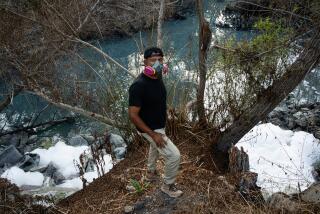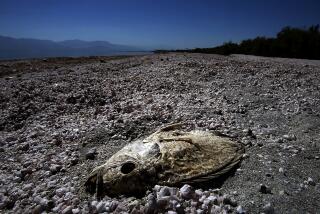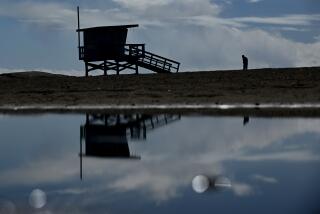Study Seeks Source of Newport Bay Pollution
Newport Beach has begun a study to determine whether the frequent closures of harbor beaches are caused in part by boaters dumping sewage from their holding tanks.
Students led by Stanley Grant, professor of environmental engineering at UC Irvine, spent several weeks sampling the water at six spots where the Orange County Health Care Agency routinely posts warnings about pollution. The researchers are now analyzing the results.
The study is one step the city is taking to comply with a 1996 federal consent decree requiring cleanup of the bay--parts of which have been off-limits to swimmers for decades. The decree requires that it be clean enough for swimming by 2013 and for shellfish-harvesting by 2019.
The rules were written after a suit against the federal Environmental Protection Agency brought by Defend the Bay, a Newport Beach-based environmental group.
“We’ve got these [10,000] boats in [the harbor] and ... the potential is there to dump into the bay,” said Tony Melum, manager of harbor resources.
Boaters, Melum said, “have been fingered in the past, but it’s never been nailed down.” He hopes the UCI study will finally determine whether boaters are to blame.
“I’m a boater,” Melum said. “And there’s absolutely no way we’d flush our heads in the bay. But there’s always been this perception that [boaters are] contributing to the problem.”
Bob Caustin, founder of Defend the Bay, believes the study falls short of a real answer to the question. He suspects the pollution is the result of numerous factors, including urban runoff and pesticides.
Caustin said that at Avalon Harbor on Catalina Island, the harbor patrol places a dye tablet in the holding tanks of all incoming boats. If someone empties their tank into the harbor, the fluorescent dye leaves a telltale sign.
But Dave Kiff, Newport Beach’s assistant city manager, said the size of Newport Bay make such a program difficult there.
The city lacks the resources for 24-hour patrols to look for the dye in the 154-square-mile bay.
More to Read
Sign up for Essential California
The most important California stories and recommendations in your inbox every morning.
You may occasionally receive promotional content from the Los Angeles Times.










